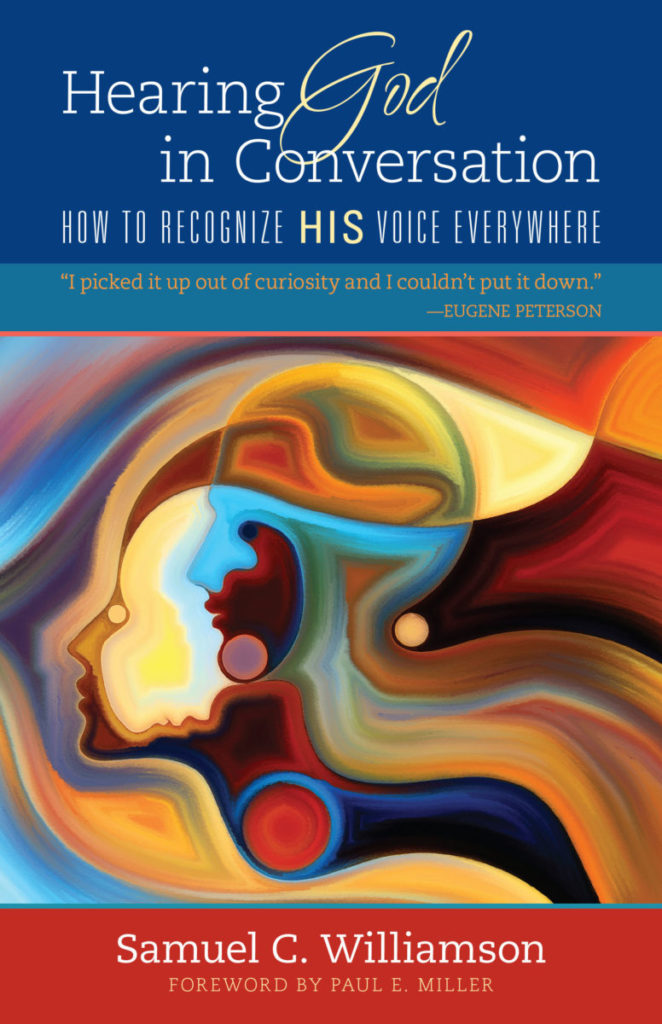“God speaks time and again—in various ways—but nobody notices” (Job 33:14).
Every human on earth longs to hear God’s voice. More than mere desire, we crave a connection with the divine, somehow to see the face of God, to touch and be touched, to know and be known. It’s an instinctive, inborn, inherited ingredient of our humanity.

Scripture says God is always speaking, but we miss it. It’s not that God has stopped speaking, it’s just that we don’t recognize it when he does. Oh, sometimes he breaks in through writing on the wall or thorough a speaking donkey, but mostly he speaks in a still, small voice.
And we miss his voice because it is drowned out in the sea of other voices. The cacophony of sounds, like an orchestra tuning, obscures that still small voice. Stomachs growl their hunger, bosses bark their orders, and that insult from twenty years ago still shouts its condemnation.
How can we learn to recognize God’s voice? Through meditation. Christian meditation trains our ears to distinguish God’s voice from the discordance of others. And once we learn to recognize God’s voice, we begin to hear it “time and again, in various ways.”
To hear God’s voice, we need to learn to meditate. Unless, like Balaam, you have a talking ass.
Christian Meditation
You and I are already meditation experts. We meditate all the time in everyday matters.
With our first child still fresh in the womb, our mind imagines the new bedroom. We picture fresh paint, where the crib fits best, the changing table and rocker. We envision our future life (nursing, teaching soccer, and Christmas mornings) and that meditation changes us today.
We take a truth—our wife’s bulging belly—and consider with our mind and heart. We let the thoughts of our mind mix with the meditations of our heart. And something inside is stirred.
Christian meditation is like that. Unlike eastern meditation—which empties its mind—we fill our minds with a truth. We examine it, let it examine us, and in that meditative mix, God speaks. Theophan the Recluse (a household name to be sure) said,
To meditate is to descend with the mind into the heart, and there to stand before the face of the Lord, ever present all seeing, within you.
How Does This Work in Day-To-Day Life?
A typical Christian prayer time involves scripture study and worship. Most study tends to be information gathering (which is good) while our worship is an expression of our spirit and heart (which is also good). Sometimes the move from study to worship feels like shifting from first to fourth gear. We need to link Scripture study with worship.
Meditation is that bridge.
My Scripture study usually includes short passages from the Old Testament, a Gospel, and a New Testament letter. Right now I’m reading Deuteronomy, Matthew, and Romans. As I read the passages (and slow is better than fast), I wait for, I look for, a quickening in my heart.
I’m not sure how else to describe it, maybe a stirring in my spirit or just a sense of God. The two on the road to Emmaus said, “Were not our hearts burning within us.” That works.
When stirring begins, I stop reading and meditate on the verses. I ask myself questions like,
- What does this reveal about God? Why would God want to reveal it to me?
- Why does this passage intrigue me? What about it stirs my curiosity?
- What would my life look like if I believed it were true?
- How does my culture twist, distort, or reject it? How has that affected me?
- Why don’t I really believe this truth deep down? What stops me from embracing it?
- How does this truth make me love God more? How does it reveal his beauty?
- What do I need to change in order to realign my heart with this truth?
I begin by analyzing the truth presented; but after a time, I move from analyzing the text to gazing at God. I move from word-ful thinking to word-less admiration. Jordan Aumann wrote,
Contemplation signifies knowledge accompanied by delight that arouses admiration and captivates the soul.
What Next?
It doesn’t happen the same way every day, and certainly not with the same intensity. Some days I’m stirred by verses in the first passage, and I skip the other passages. Other days I finish all the passages, I ask myself which stirred me the most (even if it was just a tiny bit), and I return to that passage. And gaze.
The safest—and smartest—place to learn to discern God’s voice is in Biblical meditation. But once we learn to recognize his voice in Scripture, we begin to hear it everywhere, in a movie, on a billboard, through a friend, from a stranger on a bus. And we meditate with similar questions.
My Articles
This website is mostly the expressions of my meditations. I take vague stirrings in my heart, often simple curiosities, meditate, and then express them. Sometimes it leads to confession, sometimes to question the world’s influence on Christians, and sometimes to purer worship.
Though I’ll be sure to let you know if the neigh of my horse starts to sound like Shakespeare.
Sam (the aspiring recluse)
++++++++++
This article is an excerpt from my book Hearing God in Conversation. I wrote it with the intention of helping believers develop an intimate, conversational relationship with their Heavenly Father.
Eugene Peterson said this:
I picked it up, and I couldn’t put it down. I read it straight through.
Gary Wilkerson (pastor, author, and son of David Wilkerson) said this:
This is a remarkable book that teaches both how to hear God’s voice in Scripture, and then to hear his voice in every avenue of life. It’s filled with humor, insight, practical tips, and sound theology. I can’t recommend a better guide than Hearing God in Conversation.


 Asking God for More Coincidences
Asking God for More Coincidences
Thanks, Sam. There are now at least half a dozen books by Theophan the Recluse available in English translation. From which did you draw the quote?